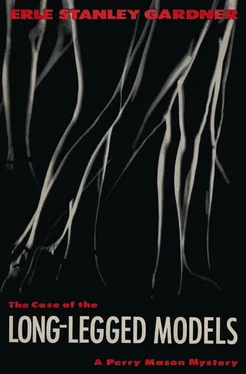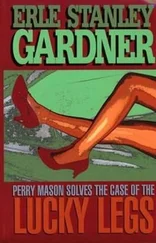“I did.”
“What did you find?”
“The doorknobs of all doors had been carefully wiped by someone so that there were no latent fingerprints on any of the knobs with one exception.”
“And that exception?”
“The back door. There was a left thumb print on that back door without anything else in the line of a latent fingerprint appearing on it.”
“Do you know whose fingerprint it was that was found on the door of this apartment?”
“Yes. sir.”
“Whose was it?”
“The fingerprint of Mr. Homer Garvin.”
“Cross-examine,” Hendrie said turning to Perry Mason.
Mason said, “How do you know that the room had been wiped clean of fingerprints?”
“Because normally there are fingerprints in every room. There are latent fingerprints some of which are smudged, some of which can be developed so that they can be identified. But when one finds a complete absence of fingerprints, it indicates that someone has removed all fingerprints, particularly from objects like doorknobs.”
“When was this done?” Mason asked.
“I can’t tell you when it was done.”
“You found a fingerprint on the knob of the back door?”
“Yes, sir. A left thumb print.”
“And you were able to identify that?”
“I did. Yes, sir. It was the left thumb print of Homer Garvin.”
“Senior or Junior?”
“Senior.”
“When was it made?”
“I can’t tell you.”
“Was it made before the murder was committed?”
“I don’t know. I do know that it was made after the knobs had been wiped clean of fingerprints, and since there was only the one fingerprint on all the doorknobs, I know that the cleaning of these objects for fingerprints must have been done while Mr. Garvin was in the room.”
“How do you know that?”
“Because there were no other fingerprints. If he had entered the room after the knobs had been cleaned, there would have been fingerprints on the knobs where he had entered the room, where he had touched the doors, but, since there was only the one absolutely perfect fingerprint, which had been made by pressure of the thumb against the knob of the door, I know that the articles had been wiped clean at a time when he was in the room.”
“This fingerprint was on the knob of the back door?”
“Yes, on the knob of the back door.”
“Wasn’t it possible that someone could have wiped the finger-prints from the inside of the knobs and that Mr. Garvin, coming up the back stairs of the apartment and finding the apartment door slightly open, had decided to close it, that he had reached in and, in doing so, had touched his thumb to the knob in this manner?”
“No, sir. That fingerprint was deliberately left on the doorknob. It was not in a position where a person would have normally placed his hand to close the door.”
Mason said, “Someone could have reversed the doorknobs, could they not?”
“What do you mean?”
“The rounded doorknob is placed on a square spindle and held in place by a setscrew. The knob which you found on the inside of the door could at some previous time have been on the outside of the door, could it not?”
“It could have, yes,” the witness reluctantly conceded.
“And the print of Mr. Garvin could have been made on the outside knob, and thereafter someone wearing gloves could have conceivably transferred the outer knob to the inside?”
“Well, of course, if you want to engage in fanciful speculation as to the things which could conceivably have happened, it could have been done.”
“That’s all,” Mason said.
“Now then, if the Court please,” Hamilton Burger said, getting to his feet, “I am going to call a hostile witness. I am going to call Homer Garvin, Sr. to the witness stand.”
“I take it,” Judge Decker said, “you wish to be permitted to ask leading questions, on the ground that you are dealing with a hostile witness. I think, however, the better practice is to call the witness to the stand and proceed with the interrogation. Then if there are objections on the ground that the questions are leading, the Court will rule on those objections at the time they are made.”
“Very well, Your Honor. Come forward, Mr. Garvin.”
Garvin came forward, was sworn, and took his position on the witness stand.
“I am going to call your attention to a shoe which has previously been marked People’s Exhibit 33 for identification. I am going to ask you if that is your shoe.”
“That is my shoe.”
“Did you wear that shoe on the night of October 7th of this year?”
“I did.”
“Did you deliberately step into a pool of blood in the apartment of George Casselman in the Ambrose Apartments at Number 948 Christine Drive, and thereafter place your foot over a footprint which you found etched in dried blood in that apartment?”
“Objected to as incompetent, irrelevant, and immaterial,” Mason said.
“The objection will be overruled.”
The witness said, “I refuse to answer.”
“On what grounds?”
“On the grounds that the answer may tend to incriminate me.”
“Your Honor, I now ask that the shoe previously marked People’s Exhibit 33 for identification be received in evidence.”
Judge Decker hesitated a moment, then said, “There appearing to be no objection, it is so ordered.”
“Did you enter Apartment 211 of the Ambrose Apartments at 948 Christine Drive on the night of October seventh?” Burger asked the witness.
“Yes.”
“At what time?”
“Perhaps about eleven or eleven-thirty in the evening.”
“Did you at that time by the means of a cloth or some other manner deliberately remove fingerprints from certain objects in that apartment?”
“I refuse to answer on the grounds that the answer may incriminate me.”
Hamilton Burger, seeing the rapt attention of the jurors, and knowing that the answers of the witness were the psychological equivalent of affirmative answers, smiled.
“On the seventh day of October, did you give or loan a weapon to the defendant in this case and tell her that you wanted her to have this weapon for her own protection?”
“I did.”
“Was that weapon the revolver which I now hand you and which is marked People’s Exhibit Number 30?”
Garvin examined the gun. “I believe that is the weapon. Yes.”
“I will ask you to describe in detail your movements on the night of October 7th.”
“I returned from Las Vegas. I went to my office where I have a shower, a wardrobe, and some clothes. I took a shower and changed my clothes.”
“Then what did you do?”
Mason said, “Now, if the Court please, I object on the ground that the movements of this witness are incompetent, irrelevant, and immaterial, except as to the two matters on which the witness has already testified; to wit, that he was in the apartment of Casselman sometime in the vicinity of eleven o’clock, and that he loaned the defendant the weapon People’s Exhibit Number 30. Aside from that, any other activities engaged in by this witness are incompetent, irrelevant and immaterial.”
“They may be very pertinent,” Hamilton Burger said.
“Then show that they are pertinent by showing what you want.”
Judge Decker frowned. “This is a very peculiar situation,” he said, “It is quite apparent to the Court what the prosecution seeks to prove by this witness, and, in view of the testimony, the time element is not too remote.”
“However, if the Court please,” Mason said, “it is quite possible that this witness may have done certain things that might be incompetent as far as the issues in this case are concerned.”
“The Court is going to sustain the objection,” Judge Decker said, “although it is apparently a close point. Quite evidently the witness has reached definite decisions in his own mind as to where he intends to exercise the privilege of his constitutional right not to incriminate himself. The Court can very readily understand that there is no Statute of Limitations which has run in the matter, and this witness is facing a very real danger in that after the conclusion of this case he is to be tried on certain matters concerning which he is now being interrogated.
Читать дальше












